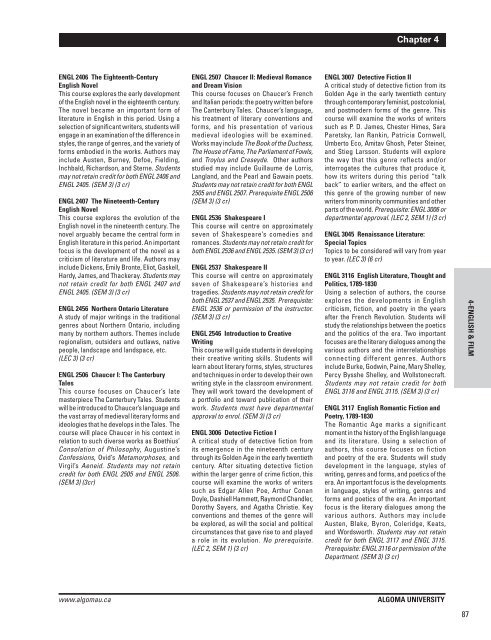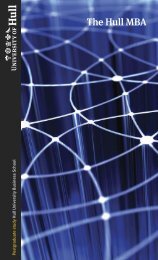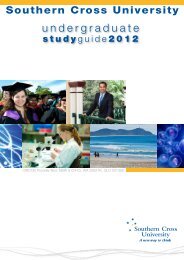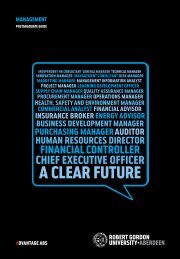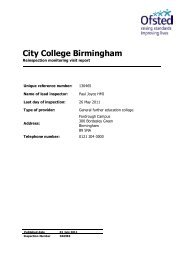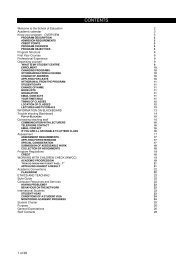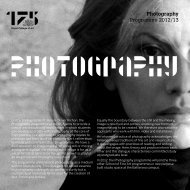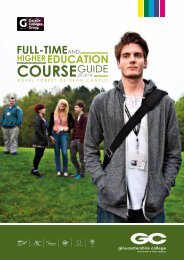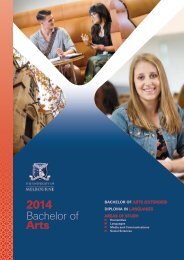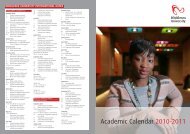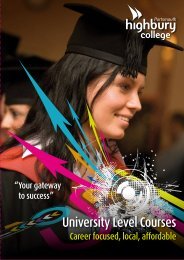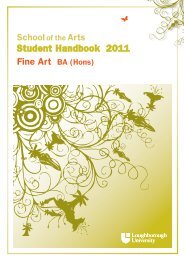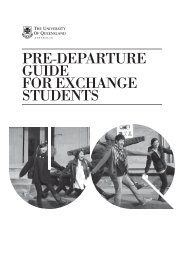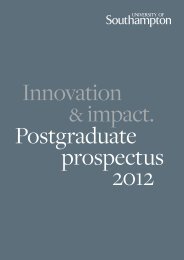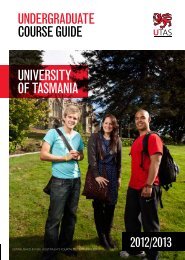You also want an ePaper? Increase the reach of your titles
YUMPU automatically turns print PDFs into web optimized ePapers that Google loves.
Chapter 4<br />
ENGL 2406 The Eighteenth-Century<br />
English Novel<br />
This course explores the early development<br />
of the English novel in the eighteenth century.<br />
The novel became an important form of<br />
literature in English in this period. Using a<br />
selection of significant writers, students will<br />
engage in an examination of the difference in<br />
styles, the range of genres, and the variety of<br />
forms embodied in the works. Authors may<br />
include Austen, Burney, Defoe, Fielding,<br />
Inchbald, Richardson, and Sterne. Students<br />
may not retain credit for both ENGL 2406 and<br />
ENGL 2405. (SEM 3) (3 cr)<br />
ENGL 2407 The Nineteenth-Century<br />
English Novel<br />
This course explores the evolution of the<br />
English novel in the nineteenth century. The<br />
novel arguably became the central form in<br />
English literature in this period. An important<br />
focus is the development of the novel as a<br />
criticism of literature and life. Authors may<br />
include Dickens, Emily Bronte, Eliot, Gaskell,<br />
Hardy, James, and Thackeray. Students may<br />
not retain credit for both ENGL 2407 and<br />
ENGL 2405. (SEM 3) (3 cr)<br />
ENGL 2456 Northern Ontario Literature<br />
A study of major writings in the traditional<br />
genres about Northern Ontario, including<br />
many by northern authors. Themes include<br />
regionalism, outsiders and outlaws, native<br />
people, landscape and landspace, etc.<br />
(LEC 3) (3 cr)<br />
ENGL 2506 Chaucer I: The Canterbury<br />
Tales<br />
This course focuses on Chaucer’s late<br />
masterpiece The Canterbury Tales. Students<br />
will be introduced to Chaucer’s language and<br />
the vast array of medieval literary forms and<br />
ideologies that he develops in the Tales. The<br />
course will place Chaucer in his context in<br />
relation to such diverse works as Boethius’<br />
Consolation of Philosophy, Augustine’s<br />
Confessions, Ovid’s Metamorphoses, and<br />
Virgil’s Aeneid. Students may not retain<br />
credit for both ENGL 2505 and ENGL 2506.<br />
(SEM 3) (3cr)<br />
ENGL 2507 Chaucer II: Medieval Romance<br />
and Dream Vision<br />
This course focuses on Chaucer’s French<br />
and Italian periods: the poetry written before<br />
The Canterbury Tales. Chaucer’s language,<br />
his treatment of literary conventions and<br />
forms, and his presentation of various<br />
medieval ideologies will be examined.<br />
Works may include The Book of the Duchess,<br />
The House of Fame, The Parliament of Fowls,<br />
and Troylus and Creseyde. Other authors<br />
studied may include Guillaume de Lorris,<br />
Langland, and the Pearl and Gawain poets.<br />
Students may not retain credit for both ENGL<br />
2505 and ENGL 2507. Prerequisite ENGL 2506<br />
(SEM 3) (3 cr)<br />
ENGL 2536 Shakespeare I<br />
This course will centre on approximately<br />
seven of Shakespeare’s comedies and<br />
romances. Students may not retain credit for<br />
both ENGL 2536 and ENGL 2535. (SEM 3) (3 cr)<br />
ENGL 2537 Shakespeare II<br />
This course will centre on approximately<br />
seven of Shakespeare’s histories and<br />
tragedies. Students may not retain credit for<br />
both ENGL 2537 and ENGL 2535. Prerequisite:<br />
ENGL 2536 or permission of the instructor.<br />
(SEM 3) (3 cr)<br />
ENGL 2546 Introduction to Creative<br />
Writing<br />
This course will guide students in developing<br />
their creative writing skills. Students will<br />
learn about literary forms, styles, structures<br />
and techniques in order to develop their own<br />
writing style in the classroom environment.<br />
They will work toward the development of<br />
a portfolio and toward publication of their<br />
work. Students must have departmental<br />
approval to enrol. (SEM 3) (3 cr)<br />
ENGL 3006 Detective Fiction I<br />
A critical study of detective fiction from<br />
its emergence in the nineteenth century<br />
through its Golden Age in the early twentieth<br />
century. After situating detective fiction<br />
within the larger genre of crime fiction, this<br />
course will examine the works of writers<br />
such as Edgar Allen Poe, Arthur Conan<br />
Doyle, Dashiell Hammett, Raymond Chandler,<br />
Dorothy Sayers, and Agatha Christie. Key<br />
conventions and themes of the genre will<br />
be explored, as will the social and political<br />
circumstances that gave rise to and played<br />
a role in its evolution. No prerequisite.<br />
(LEC 2, SEM 1) (3 cr)<br />
ENGL 3007 Detective Fiction II<br />
A critical study of detective fiction from its<br />
Golden Age in the early twentieth century<br />
through contemporary feminist, postcolonial,<br />
and postmodern forms of the genre. This<br />
course will examine the works of writers<br />
such as P. D. James, Chester Himes, Sara<br />
Paretsky, Ian Rankin, Patricia Cornwell,<br />
Umberto Eco, Amitav Ghosh, Peter Steiner,<br />
and Stieg Larsson. Students will explore<br />
the way that this genre reflects and/or<br />
interrogates the cultures that produce it,<br />
how its writers during this period “talk<br />
back” to earlier writers, and the effect on<br />
this genre of the growing number of new<br />
writers from minority communities and other<br />
parts of the world. Prerequisite: ENGL 3006 or<br />
departmental approval. (LEC 2, SEM 1) (3 cr)<br />
ENGL 3045 Renaissance Literature:<br />
Special Topics<br />
Topics to be considered will vary from year<br />
to year. (LEC 3) (6 cr)<br />
ENGL 3116 English Literature, Thought and<br />
Politics, 1789-1830<br />
Using a selection of authors, the course<br />
explores the developments in English<br />
criticism, fiction, and poetry in the years<br />
after the French Revolution. Students will<br />
study the relationships between the poetics<br />
and the politics of the era. Two important<br />
focuses are the literary dialogues among the<br />
various authors and the interrelationships<br />
connecting different genres. Authors<br />
include Burke, Godwin, Paine, Mary Shelley,<br />
Percy Bysshe Shelley, and Wollstonecraft.<br />
Students may not retain credit for both<br />
ENGL 3116 and ENGL 3115. (SEM 3) (3 cr)<br />
ENGL 3117 English Romantic Fiction and<br />
Poetry, 1789-1830<br />
The Romantic Age marks a significant<br />
moment in the history of the English language<br />
and its literature. Using a selection of<br />
authors, this course focuses on fiction<br />
and poetry of the era. Students will study<br />
development in the language, styles of<br />
writing, genres and forms, and poetics of the<br />
era. An important focus is the developments<br />
in language, styles of writing, genres and<br />
forms and poetics of the era. An important<br />
focus is the literary dialogues among the<br />
various authors. Authors may include<br />
Austen, Blake, Byron, Coleridge, Keats,<br />
and Wordsworth. Students may not retain<br />
credit for both ENGL 3117 and ENGL 3115.<br />
Prerequisite: ENGL 3116 or permission of the<br />
Department. (SEM 3) (3 cr)<br />
4-ENGLISH & FILM<br />
www.algomau.ca<br />
ALGOMA UNIVERSITY<br />
87


